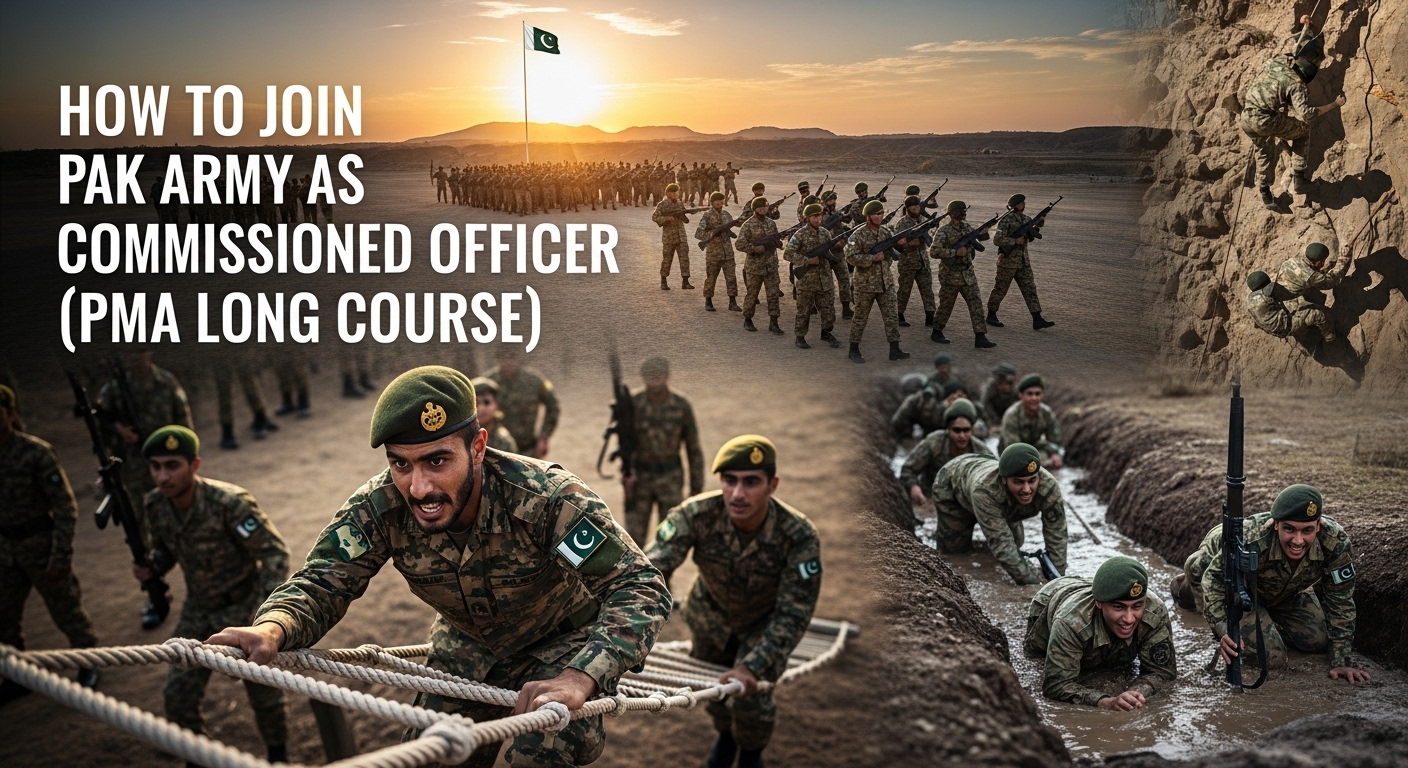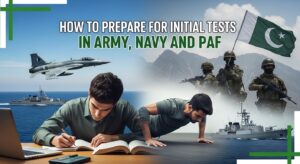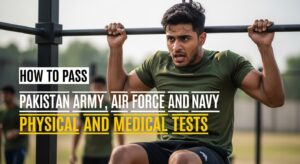Do you dream of serving your nation with honor, leading from the front, and becoming a part of Pakistan’s esteemed armed forces?
So if you have made up your mind for joining the Pakistan Army as a commissioned officer through the Pakistan Military Academy (PMA) Long Course, this guide is specifically tailored for you, providing practical advice and local context to help you navigate this prestigious selection process.
Becoming an officer in the Pakistan Army is more than just a job; it’s a commitment to a life of service, sacrifice, and immense personal growth. It’s a journey that transforms young individuals into disciplined, courageous, and capable leaders. This comprehensive guide will walk you through every step of the process, from understanding the initial requirements to the rigorous training at PMA Kakul.
Understanding the PMA Long Course
The PMA Long Course is the primary entry scheme for male individuals seeking a regular commission in the Pakistan Army. It’s a two-year training program at the Pakistan Military Academy in Kakul, Abbottabad, after which successful cadets are commissioned as Second Lieutenants.
What is the PMA Long Course?
The PMA Long Course is a rigorous training program designed to transform civilian candidates into proficient military officers. It’s an intensive period of academic learning, physical conditioning, character building, and leadership development.
Why Should You Join the PMA Long Course?
Joining the PMA Long Course offers a unique opportunity for a distinguished career. You’ll gain world-class training, develop unparalleled leadership skills, and contribute directly to the defense of Pakistan. Beyond the prestige, it offers job security, attractive remuneration, comprehensive healthcare, and educational benefits for your family.
Who is the PMA Long Course For?
This course is for young, ambitious Pakistani men who possess strong academic potential, robust physical fitness, and an unwavering desire to serve their country. It demands dedication, resilience, and a willingness to embrace challenges.
Step 1: Meeting the Eligibility Criteria
Before you even think about applying, it’s crucial to understand and meet the fundamental eligibility requirements. These are strict and non-negotiable, so ensure you tick all the boxes.
| Eligibility Criteria | Details |
|---|---|
| Nationality | Must be a citizen of Pakistan or a domicile holder of Azad Kashmir/Gilgit-Baltistan. Dual nationality holders must surrender other nationality upon final selection. |
| Gender | Only male candidates are eligible for the PMA Long Course. |
| Marital Status | Generally, unmarried individuals are eligible. Married serving personnel of the Armed Forces over 20 years of age may also apply. |
| Age | Intermediate (or equivalent): 17–22 years (typically) with 3-month relaxation for upper and lower limits. Graduates (2-year program) & serving PN/PAF: 17–23 years with similar relaxation. Graduates (4-year program – BS/BA-Hons/BBA/BPA): 17–24 years, no relaxation. Serving Army Soldiers: 17–25 years, no relaxation. Always check latest advertisement for exact cut-off dates. |
| Education – Intermediate (FA/FSc or equivalent) | Minimum 55% marks required. Relaxed to 50% for candidates from: Balochistan, FATA, Gilgit-Baltistan, District Neelum AJ&K, District Kohistan, Chitral, Dir, Tehsil Bala Kot (Mansehra, KPK), Tharparker & Tehsil Umer Kot (Sindh), District Rajanpur, Cholistan Desert areas, Drawar Fort, Salamsar, Mojgarh, Dingarh (Punjab). |
| Education – Graduates (2-year program) & Serving PN/PAF Personnel | Minimum 50% in FA/FSc and 60% or above in BA/BSc. |
| Education – Graduates (4-year program – BS/BA-Hons/BBA/BPA) | 60% or above in degree, with 50% in FA/FSc. |
| Education – Serving Army Soldiers | 50% marks in FA/FSc or equivalent. |
| Hope Certificate | Candidates awaiting Part-II results of Intermediate with at least 60% in Part-I may apply using a “Hope Certificate” from the institution’s head, confirming expected minimum 55% marks in final exams. Final result card must be submitted within one week of board announcement. |
| A-Levels / Equivalent from abroad | Equivalence certificate from IBCC required if results are less than three Cs. Otherwise, aggregate 55% marks usually sufficient for A-Level candidates applying in Pakistan. |
| Physical Standards – Height | Minimum 5 feet 4 inches (162.5 cm). |
| Physical Standards – Weight | As per Body Mass Index (BMI). |
| Physical Standards – Vision | Detailed eyesight criteria provided in official advertisement; generally good vision required. |
Common Mistakes & Tips:
- Ignoring the latest advertisement: Criteria can change slightly. Always refer to the most recent official announcement on www.joinpakarmy.gov.pk.
- Miscalculating age: Pay close attention to the cut-off date for age calculation.
- Not having proper documentation: Ensure your academic certificates are original and verified. If you have duplicate or revised mark sheets, get a verification certificate from your board/university secretary.
- Neglecting physical fitness early: Don’t wait until the last minute to start physical preparation.
Step 2: Online Registration and Application Submission
Once you meet the eligibility criteria, the next step is to register online and submit your application. This is typically done through the official Pakistan Army website.
- Visit the Website: Go to www.joinpakarmy.gov.pk. Look for the “PMA Long Course” section and the current advertisement.
- Create an Account/Login: If it’s your first time, you might need to create an account. If you’ve applied before, use your existing login.
- Fill the Application Form: Carefully fill in all your personal details, academic qualifications, and contact information. Double-check every entry for accuracy.
- Upload Documents: You may be required to upload scanned copies of your CNIC/Form B, academic certificates, domicile, and recent photographs. Ensure these are clear and meet the specified file size/format.
- Select an Army Selection and Recruitment Centre (AS&RC): Choose the AS&RC that is most convenient for you to appear for the initial tests.
- Pay Registration Fee: Follow the instructions to pay the non-refundable registration fee, usually through a designated bank or online payment method. Keep the payment receipt safe.
- Print Roll Number Slip: After successful registration and fee payment, you will be able to print your roll number slip. This slip will contain your test date, time, and venue.
Common Mistakes & Tips:
- Missing the deadline: Online registration periods are strict. Apply well before the closing date to avoid last-minute technical issues.
- Incorrect information: Any discrepancy between your application details and original documents can cause problems later. Be truthful and accurate.
- Poor quality scanned documents: Ensure your scanned documents are legible.
- Forgetting to print the roll number slip: This is your entry ticket to the initial tests.
Step 3: Initial Tests at Army Selection and Recruitment Centre (AS&RC)
The first major hurdle in your journey will be the initial tests conducted at your chosen AS&RC. These include written tests, physical tests, and a preliminary medical examination.
| Stage | What it is |
|---|---|
| Written / Intelligence & Academic Test (Computerized) | Computer-based test comprising intelligence (verbal & non-verbal) and academic portions. Intelligence Test: Assesses mental alertness, reasoning, problem-solving, patterns, series, analogies, and logical questions. Academic Test: Covers English, Mathematics, Pakistan Studies, Islamiyat, and General Knowledge. |
| Physical Test | Series of physical endurance and strength exercises. Exercises typically include: – 1.6 km (1 mile) run (e.g., within 8 minutes) – Push-ups (e.g., 15 in 2 minutes) – Sit-ups/Crunches (e.g., 20 in 2 minutes) – Pull-ups (e.g., 3 in 2 minutes) – Ditch Crossing (e.g., 7.4 feet wide) |
| Initial Medical Examination | Basic medical check-up to confirm minimum physical and health standards. Checks height, weight, vision, hearing, dental health, and general physical condition. Major medical conditions (Hepatitis B/C, chronic diseases, serious vision/hearing impairments) lead to disqualification. |
| Initial Interview | Preliminary interview conducted by an officer at the AS&RC. |
Step 4: Submission of ISSB Forms
If you successfully clear all the initial tests at the AS&RC, you will be given Inter Services Selection Board (ISSB) forms. This is a significant step, as the ISSB is the final and most crucial selection stage.
- Collect Forms: You will receive a set of detailed forms from the AS&RC after passing the initial tests.
- Read Instructions Carefully: Go through all instructions on the forms before filling them.
- Provide Accurate Information: Fill in all personal, academic, family, and extracurricular details truthfully and completely. This includes your hobbies, sports achievements, positions of responsibility, and any previous attempts at ISSB.
- Attach Required Documents: You will need to attach attested photocopies of your CNIC, academic certificates, domicile, and recent passport-sized photographs.
- Review and Submit: Before submitting, review all information to ensure there are no errors or omissions. Submit the forms to the AS&RC within the given deadline.
Common Mistakes & Tips:
- Leaving sections blank: Fill out every relevant section.
- Providing false information: Any dishonesty will be detected and lead to immediate rejection.
- Delaying submission: Adhere to the deadlines given by the AS&RC.
Step 5: Inter Services Selection Board (ISSB) Tests
The Inter Services Selection Board (ISSB) is a four-day rigorous assessment that evaluates your potential to become an officer. It is designed to identify individuals with the qualities of leadership, courage, integrity, and intellectual capacity required in the armed forces.
During your stay, you will be provided free messing and lodging. Ensure you bring appropriate clothing, including formal wear for dining and sportswear for physical activities.
| Day / Stage & Purpose / Assessment Focus | Details / Activities & Tips / Preparation |
|---|---|
Day 1: Reporting & Psychological Tests Evaluate mental agility, inherent personality traits, thought processes, emotional responses | Reporting: Arrive at ISSB center, complete registration, settle in. Intelligence Tests: Assess mental agility. Personality Tests: Picture Story Writing (TAT), Word Association Test (WAT), Sentence Completion Test (SCT), Self-Description (SD). Tips: Be spontaneous and honest. Avoid trying to portray someone else. Practice writing quick, positive, realistic stories. |
Day 2: Group Tests & Interviews Assess teamwork, leadership potential, problem-solving, initiative, physical courage, general knowledge, communication skills, and personality traits | Group Discussions (GD): Participate in discussions, articulate ideas, listen, persuade. Group Planning Exercise (GPE): Devise group solutions to practical problems. Progressive Group Tasks (PGT): Outdoor group problem-solving with limited resources. Half Group Task (HGT): Similar to PGT with smaller group for individual assessment. Individual Obstacles: Physical challenges testing courage, agility, determination. Lecturette: Deliver a short lecture on a topic to assess communication & confidence. Interviews: Conducted with President of the Board, Deputy President, and/or Psychologist. Tips: Actively participate in group tasks without dominating. Encourage others. For obstacles, give best effort. For interviews, be truthful, confident, articulate, and prepared to discuss family, education, strengths, weaknesses, and motivation to join the Army. |
Day 3: Final Group Tasks & Physical Ability Test (PAT) / Command Task Assess leadership, decision-making under pressure, teamwork, and physical fitness | Command Task (CT): Lead a small group to complete a task. Final Group Task (FGT): Observe group dynamics and individual contributions in a relaxed environment. Physical Ability Test (PAT): Re-evaluation of physical fitness, sometimes including long jump, chin-ups, Burma bridge, etc. Tips: Be decisive, delegate effectively, motivate your team. Continue to give best effort in physical tasks. |
Day 4: Conference & Departure Final evaluation of overall performance across all tests | Conference: Assessors discuss performance of all candidates and make final recommendations. Departure: Candidates are debriefed and given travel allowance before leaving. Tips: Stay attentive during debriefing, note feedback if given. Prepare for travel arrangements. |
Common Mistakes & Challenges at ISSB:
- Faking personality: Trying to project an “ideal” military personality. Be yourself, but show your best self.
- Lack of confidence: Hesitation and indecisiveness are red flags.
- Poor communication skills: Inability to express thoughts clearly.
- Lack of general awareness: Not knowing about current events.
- Poor physical fitness: Not being able to complete tasks.
- Negative attitude in group tasks: Dominating or being uncooperative.
Key Qualities ISSB Looks For:
- Leadership potential
- Courage (physical and moral)
- Initiative
- Decision-making ability
- Planning and organizing skills
- Teamwork and cooperation
- Emotional stability
- General awareness
- Motivation to join the army
Step 6: Medical Examination by Appeal Medical Board (AMB) / GHQ Selection Board
If you are recommended by the ISSB, you will undergo a comprehensive medical examination to ensure you are fully fit for military service.
- Receive Instructions: You will receive a call letter or notification from GHQ with details about your medical examination date and venue.
- Comprehensive Check-up: The medical board will conduct a thorough examination, including blood tests, urine tests, X-rays, ECG, detailed eye and ear tests, and checks for any previous injuries or surgeries.
- Specialist Consultations: If any issues are identified, you may be referred to specialists for further evaluation.
- Appeal Medical Board (AMB): If you are declared medically unfit, you may have the option to appeal the decision and appear before an Appeal Medical Board, provided your case meets the specified criteria.
Common Mistakes & Tips:
- Hiding medical conditions: Be transparent about your health history. The army’s medical checks are very thorough.
- Ignoring minor issues: Address any dental issues, vision problems, or other minor ailments before your medical exam.
Step 7: Final Merit List and Induction
The final selection is based on your overall performance in all stages of the selection process, primarily your ISSB recommendation and academic record. Not everyone recommended by ISSB is selected, as selection is based on a limited number of vacancies and a competitive merit list.
- Merit Calculation: Your performance in the ISSB holds the most weight, combined with your academic achievements.
- Notification: Successful candidates receive an official call letter from GHQ for induction into the Pakistan Military Academy, Kakul. This letter will contain all necessary instructions regarding reporting dates and required items.
- Pre-induction Preparations: Start preparing yourself mentally and physically for the rigorous training ahead.
Common Mistakes & Tips:
- Assuming selection: A recommendation from ISSB does not guarantee final selection.
- Losing motivation: If you don’t get selected in one attempt, analyze your shortcomings, improve, and apply again if you’re still eligible. Many successful officers cleared ISSB on their second or third attempt.
Step 8: Training at Pakistan Military Academy (PMA) Kakul
Congratulations! If you’ve reached this stage, you’re officially a Gentleman Cadet (GC) at the prestigious Pakistan Military Academy, Kakul. This two-year period is transformative, shaping you into a future leader of the Pakistan Army.
- The Training Environment: PMA Kakul is an iconic institution known for its discipline, tough physical regimens, and comprehensive academic instruction. You will live with fellow cadets, forming bonds that last a lifetime.
- Training Structure: The two-year course is divided into four terms, each building upon the previous one.
- Physical Training: This is a core component. You’ll engage in daily physical exercise, including running, obstacle courses, drills, and sports. Standards increase with each term.
- Academic Training: You will study military subjects, including tactics, military history, leadership principles, and general education subjects.
- Leadership Development: Through various tasks, exercises, and responsibilities, you will hone your leadership skills, learn to make quick decisions, and lead your peers.
- Character Building: Emphasis is placed on developing qualities like integrity, courage, discipline, self-reliance, and camaraderie.
- Field Training: Regular field exercises will expose you to practical military operations and survival skills.
- Drill: Precision drill is fundamental to military discipline and teamwork.
Life at PMA Kakul:
- Strict Discipline: Life at PMA is highly structured and disciplined. Every minute of your day will be planned.
- Camaraderie: You will live and train with your course mates, forming strong bonds and a unique sense of brotherhood.
- Challenges: Expect physical and mental challenges that will push your limits. These are designed to build resilience and character.
- Learning and Growth: You will learn a vast amount, not just about military subjects, but also about yourself, your capabilities, and how to operate under pressure.
Graduation and Commissioning:
Upon successful completion of the two-year training, you will graduate from PMA Kakul and be commissioned as a Second Lieutenant in the Pakistan Army, ready to embark on your service to the nation.
Conclusion
Joining the Pakistan Army as a commissioned officer through the PMA Long Course is a noble and prestigious undertaking. It requires immense dedication, hard work, and a genuine desire to serve Pakistan. The journey is rigorous, from the initial tests and the demanding ISSB to the transformative training at PMA Kakul. H1owever, for those who succeed, it offers a fulfilling career, personal growth, and the profound honor of defending the homeland. Prepare diligently, stay focused, and embrace every challenge with courage and determination. Your nation awaits your service.
Resources
- Official “Join Pak Army” Website: www.joinpakarmy.gov.pk
- Inter Services Selection Board (ISSB) Official Website: www.issb.gov.pk
- Various guidebooks and preparation materials for initial tests and ISSB available at local bookstores and online.
- Coaching academies for initial test and ISSB preparation (e.g., Dogar Books, Tabir Academy, and other local institutes).











